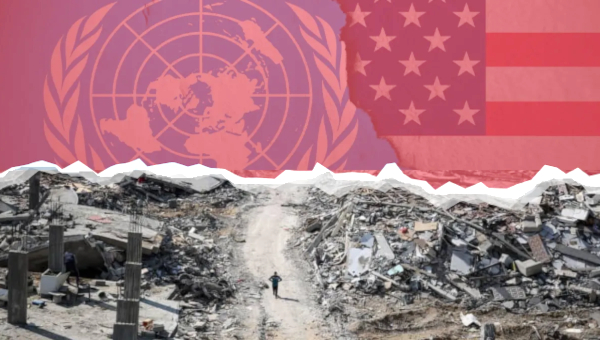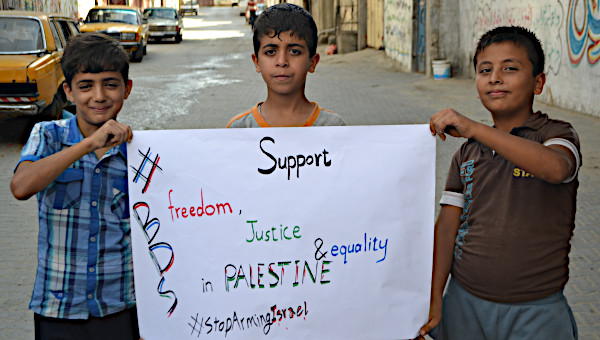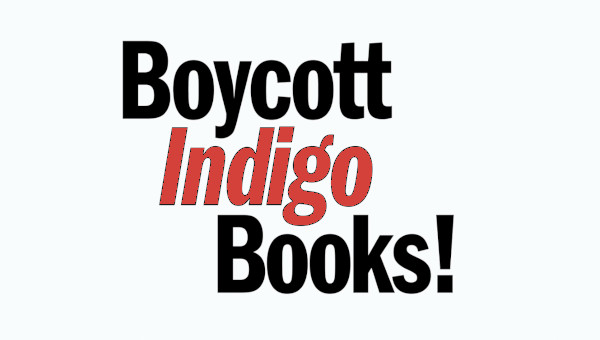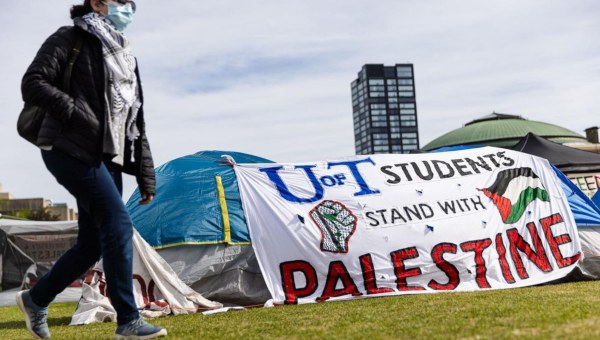This Is What Complicity Looks Like: Palestine and the Silencing Campaign on Campus
The campaign to silence Palestine solidarity reaches its annual crescendo during Israeli Apartheid Week (IAW). As IAW 2011 approaches, we need to prepare for another round of silencing. This means assessing the silencing campaign and the experience of standing up for free expression over the last few years.
The ongoing campaign to silence Palestine solidarity on Ontario (and Canadian) campuses represents a major assault on academic freedom and freedom of expression in general. Over the past five years, attempts to suppress speech about the issue of Palestine and the Israeli-Palestinian conflict have become routine, both on and off campuses. The goal of this campaign is quite simply to shut down political activism and scholarly exchange that explores Palestinian experiences and/or criticizes the Israeli state. This silencing project echoes that of the Israeli state itself, which has systematically clamped down on all aspects of Palestinian life while trying to eliminate signs and memories of Palestinian existence.
IAW Attacked
The silencing campaign on Ontario campuses has included: the attempt to ban the words “Israeli apartheid” on McMaster campus in 2008; the banning of Israeli Apartheid Week posters on four campuses in 2009; ongoing attempts to ban IAW altogether including a motion in the Ontario Legislature condemning the event; efforts to shut down the “Israel/Palestine: Mapping Models of Statehood and Paths to Peace” conference at York University in 2009, including political pressure on the SSHRC to defund the conference and an unprecedented inquiry commissioned by the York administration to investigate that conference; a campaign of attacks on the York University administration for letting former British MP George Galloway speak on campus after being banned from Canada at least in part on the basis of his Palestine solidarity work; attacks in the National Post and the Ontario Legislature on the Sociology and Equity Studies program at Ontario Institute for Studies in Education (OISE) (part of the University of Toronto) and specifically on the thesis of one of its graduate students, Jenny Peto; and most recently, the assessment of extraordinary security fees to shut down a talk by American scholar Norman Finkelstein at Mohawk College in Hamilton.These relatively overt acts of silencing are accompanied by more insidious attempts to restrict the boundaries of legitimate debate.
In this essay, we explore both the overt and the more subtle aspects of the silencing campaign, analyzing specific instances to examine their broad implications for freedom of expression and activism on campus.
Palestine, Academic Freedom and Neoliberal Education
The silencing campaign is particularly dangerous given the overall political climate, which facilitates the neoliberalization of education. The goal of neoliberalism in post-secondary education is to make the universities serve exclusively economic goals, preparing students for the corporate workplace and creating know how that can be commercialized. This requires a serious culture shift on campuses.
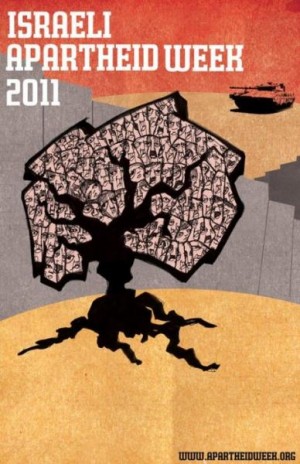
One of the core political projects of neoliberalism on campus has been to roll back the spaces for campus activism and freedom of expression originally won by student militancy in the 1960s and 1970s. The campus silencing campaign against Palestine solidarity aligns in important ways with this neoliberal agenda, shutting down political spaces in the interest of a narrow vocational conception of education. Campus equity movements are particular targets in this broader effort, as they have won a certain limited space for themselves, and often critique the limits of the dominant forms of academic knowledge.
The silencing campaign around Palestine solidarity organizing has played a leading role in the attack on freedom of expression on campuses. There are in fact two ideas of academic freedom and campus freedom of expression at stake. The first is the narrow and professional conception of academic freedom, which stresses the right of the professor to conduct free inquiry within his or her own specific realm of expertise and to disseminate the results of that inquiry through publication or teaching. This sense of academic freedom informs the influential “Declaration of Principles on Academic Freedom and Academic Tenure” developed in the U.S. in 1915.
The second, and more recent, conception of campus freedom of expression and academic freedom was won through struggles from below by the radical student movement of the 1960s. The freedom struggles of African-Americans galvanized activists, including students who fought for the right to build solidarity campaigns on campuses. This was strongly opposed by university administrations, who sought to keep activist politics safely off campus.
Nowhere was this struggle sharper than at the Berkeley campus of University of California. There, the Free Speech Movement fought for political rights on campus, challenging the administration of Clark Kerr who was perhaps the most prominent advocate of the technocratic university serving the needs of corporations and the state. Clark Kerr was, in many ways, the forerunner of the current neoliberal strategy of reorganizing universities to focus more clearly on the service of business and the lean state.
In the 1960s, Kerr was actually defeated by a mass, militant student movement. But the technocratic vision that the radical student movement of the 1960s successfully defended against has returned in new and aggressive forms under neoliberalism. And part of this agenda is to politically cleanse campuses, stripping away the political rights students won through militancy in the 1960s. The attack on Palestine solidarity is a leading thrust in the current campaign to roll back campus political expression and to define academic freedom in narrow professional terms. The Iacobucci report at York, discussed below, is an important example of this logic.
The gains of campus equity movements since the 1960s pose an important obstacle to the narrow definition of academic freedom. Serious struggles against racism, sexism and heterosexism necessarily raise questions about the nature of knowledge and its supposed objectivity. These movements show the ways fundamental inequalities distort knowledge, often in unrecognized ways. Equity movements therefore challenge the conception of expertise that underlies the narrow definition of academic freedom, arguing that the person who experiences systemic inequality often sees it more clearly than someone in a privileged position.
As the case for Israeli policy has become harder to make after five years of the highly effective Palestinian-led global Boycott Divestment and Sanctions (BDS) campaign, pro-Israel advocacy organizations have sought to shut down their opponents through silencing. In doing so, they are not only attempting yet again to shut down any expression of Palestinian experience, but also to weaken protections for freedom of expression and narrow the conception of academic freedom. This is a serious attack, and one that resonates with the neoliberal restructuring of the universities.
Attacks on a Master’s Thesis
In December 2010, Jenny Peto’s Master’s thesis at OISE was the topic of at least five articles or commentaries in the National Post, as well as discussion on the floor of the Ontario Legislature. The attention that Peto’s work attracted was not in the form of a serious engagement with the thoughtful and provocative arguments she makes. It was simply another salvo in the ongoing silencing campaign aimed at shutting down criticism of Israel.
The silencing campaign has focused largely on redefining ‘anti-Semitism,’ shifting the focus of the term away from the human rights of Jewish people, toward criticism of Israel. The Canadian Parliamentary Coalition to Combat Antisemitism (CPCCA) was created in 2009 to institutionalize or legislate this definition of ‘anti-Semitism’ [see “Silencing Criticism of Israeli Apartheid”]. The goal is to rule the work of Peto and many others critical of Israel out of bounds, criminal even, by labeling it “anti-Semitic.” This is an attempt to cast Israeli policies and Palestinian experiences outside the realm of legitimate inquiry or debate.
Peto’s thesis has two main ideas. The first is that the status of (European-ancestry) Jewish people in Canadian society has changed dramatically over the past 70 years, moving from outsiders facing overt discrimination to insiders sharing in the privileges that white skin brings in a racist society. She does not suggest that anti-Semitism has been eliminated, but that it has become more marginal in its impact on the life opportunities of Jewish people.
The second idea is that the history of Jewish suffering, and specifically the horrific experience of the Holocaust, has at times been used narrowly by a now more privileged community to build support for Israel. The thesis examines the specific cases of two Holocaust education projects ‘March of the Living’ and the ‘March of Remembrance and Hope’ to look at the ways this happens.
Of course, people might disagree with Peto’s argument, and debate on these topics is welcome. But to rule that these arguments in themselves constitute anti-Semitism is to debase that term and turn it into a mere tool for silencing. University communities interested in academic freedom, and indeed anyone interested in freedom of expression, should be concerned about the silencing tactics that have been used against Peto.
Individually, Peto was subjected to a particularly vicious attack in part because of her record as an activist in the Palestinian Boycott Divestment and Sanctions movement. As we will see below, part of the silencing campaign is to drive a wedge between activist knowledge and academic inquiry. But she was also attacked as a way to damage the reputation of OISE (the Ontario Institute for Studies in Education). Her supervisor was singled out for attack, as was her program (Sociology and Equity Studies in Education) and the institution itself. OISE, and specifically SESE, is being singled out here because of the deep commitment to equity and to challenging the dominant Eurocentric conceptions of knowledge that dominate the academic scene.
The University of Toronto’s official response to these attacks was to defend the academic freedom of the thesis writer and the institution. Provost Cheryl Misak was quoted in the Toronto Star as stating that “freedom of inquiry lies at the very heart of our institution” and that “the best way for controversy to unfold is for members of our community to engage with the perspectives and arguments they dispute” (December 7, 2010). The defence of academic freedom, narrowly defined, in the face of this silencing attack is very important. Yet we will see below that this has gone along with institutional restrictions on freedom of expression.
Fragile Freedoms and the Silencing Campaign
The attack on Jenny Peto is not the only case that pits the silencing campaign against academic freedom, narrowly defined. The pressure to shut down an academic conference at York University, and subsequent retrospective inquiry, have also challenged even the narrow conception of academic freedom. The conference, “Israel/Palestine: Mapping Models of Statehood and Paths to Peace,” was partially funded by Canada’s main academic research funding body, SSHRC, through a standard peer review process. It was opposed by many pro-Israel groups and by some individual faculty members because it explored the different models of statehood for the area of Israel/Palestine, including the one-state model.
A freedom of information request has released e-mails demonstrating that senior administrators at York University put intense pressure on the organizers of the conference [see www.fragilefreedomatyorku.ca]. According to these emails, senior administrators at York University, in collaboration with the Chair of the Board of Governors (which is a non-academic position) made and implemented plans to interfere with the organizing of the academic conference. The organizing committee of the conference (three professors and one doctoral student) was pressured to make changes to the conference content, to change the composition of the organizing committee (by excluding a Palestinian member or adding a pro-Israel member), to invite specific speakers and disinvite other speakers, and to shorten the conference or transform it into a “by invitation only” workshop. The emails show that the organizers were pressured in order to “shape [the conference] in the right direction” and “to rework the agenda” using different tactics which included cancelling room bookings and threats to withdraw sponsorship. Despite the intense pressure which aimed at “cracking the armour” or putting “the fear of the three gods” in the organizers, the conference went on as planned.[1]
The York University administration then engaged in an extraordinary after the fact investigation of the conference. They appointed Frank Iacobucci, former Justice of the Supreme Court of Canada, to review the conference. The terms of reference for the Iacobucci investigation were devised by the senior administration, including those who were involved in pressuring the conference organizers.
The report presented a highly selective account of the conference process and the role of the university. It has been deemed “unsound and unreliable” and “fundamentally flawed” both procedurally and substantively, and a call for its rejection was submitted to Senate by both the Osgoode Hall Faculty Association and the Graduate Law Students’ Association of Osgoode Hall. Perhaps most importantly, Iacobucci’s narrow and skewed representation of the events allows him to make recommendations that ignore serious concerns about violations of academic freedom by the York administration, and that erase or downplay the agency of pro-Israeli groups and individual faculty members at York.
The numerous shortcomings of the Iacobucci Report reflect the broader pattern of the silencing campaign. In this case they facilitate the report’s entry into the process of reframing academic freedom on narrower terms and reconfiguring the campus as a depoliticized space. This is accomplished subtly, particularly through its validation of keywords like “respectful discourse” and “academic responsibility.” Such concepts appear benign and supportive of expanding academic freedoms on campus. They also appear to originate primarily from within the terrain of academic freedom discourse. Upon closer scrutiny, however, it is clear that the insertion of this vocabulary of neoliberal managerialism used in the Iacobucci Report reflects a convergence with parallel discourses (e.g., “dialogue,” “civility” and “academic responsibility”) used by pro-Israel campus lobbying groups.
The Context of Fragile Freedoms
In her well-documented analysis of academic freedom violations around the conference, Susan Drummond (one of the organizers) identified the key stimulus for the controversy around Palestine events on campus as “the ways in which organized lobbying groups have attempted to pressure academic discourse so that it lines up with a particular stance on foreign policy.” She makes this observation by comparing the Mapping Models experience with a similar event that transpired recently at a campus in the United States. In her assessment, the pressure tactics of pro-Israeli organizations at the U.S. event is “ominously reminiscent” of those which transpired at York University.
Drummond also draws attention to an influential discussion paper, “Academic Rights, Academic Responsibilities: A New Approach.” Published in 2007 by the U.S.-based Israel on Campus Coalition (ICC), the paper is aimed at influencing the “campus environment,” including university administrative policies and practices, in support of pro-Israeli concerns and directions. By inserting itself as an “organization dedicated to generating a genuine understanding of contemporary Israel at America’s 4,000 institutions of higher learning,” the ICC recommends a series of institutional “Action Steps” (i.e., creating review committees, using codes of conduct, establishing task forces and filing grievances).
While no comparable document currently defines and coordinates the pro-Israel lobbying interests in the Canadian university context, there is a direct resonance with key ideas emphasized in the Iacobucci Report. It is instructive then to examine the report, and York University administration’s handling of the Mapping Models conference, to gain insight into the character and current directions of the silencing campaign. We argue that campus administrations have been particularly receptive to pro-Israel positions on campus in the context of the ongoing neoliberalization of universities and its accompanying practices of governance.
At stake here is the reconfiguring of campus political space through reframing the terms of academic freedom and campus freedom of expression. Like the ICC Report, Iacobucci provides a tool chest for university administrations seeking to reframe the political space of campus. Specifically, these tools create new mechanisms of regulation in contexts where overt silencing has become ineffective due to the growing strength of the BDS movement and Palestine solidarity.
The position of Israel advocacy groups has been to call upon campus administrators in Canada to silence criticism of Israel by unilaterally shutting down debate. This has posed some problems for university administrations, who can only go so far with overt silencing when they meet significant opposition. The Iacobucci report emerges as useful in this context. Not only does it provide language for justifying some overt silencing but it also promotes more supple institutional courses of action that achieve the goals of shutting down scholarly work and activism around Palestine.
It is particularly significant that the Iacobucci report situates the conference itself as the core problem. This is established by treating as largely axiomatic the idea that the conference was exceptionally controversial, and over-emphasizing its critics’ characterizations of it as having “created tensions, posed hurdles” (p. 2/3), creating a “non-academic atmosphere” and “an intimidating environment” (p. 28), exuding “a strong political bias” as “’anti-Israel’” (p. 27). This characterization prevails in the report by over-amplifying the claims of pro-Israeli critics, de-emphasizing the organized pro-Israeli and administrative attacks on the conference, and de-contextualizing the account from the history of systematic and sustained attacks on Palestine-related issues on campuses. The voices of the many that participated in the event and valued the experience (including ourselves) are also peculiarly muted in the report. Through these narrative mechanisms, the report is able to manufacture an overall impression that concurs with the position attributed to “some attendees” that “the Conference simply became the latest in a line of conferences in which the same group of anti-Israel activists came together for a political purpose” (p. 30).
Within this ideological frame York’s decision to commission the Report appears reasonable, justified and responsible. The assertion that the main problems emanate from the conference itself provides the grounds for then claiming that administrative attention is required. While not acknowledged as such, the report certainly shares language and terms promoted by pro-Israel groups, including overlap with recommendations in the Israel on Campus report. This insidious convergence thus creates an avenue for revamping the terms of the silencing campaign, adding new tools through the creation of administrative trump cards to narrow expression on campus.
Because these trump cards permit academic freedom to prevail on certain narrow terms, they can do the work of administrative silencing while appearing non-repressive, non-racial and non-aligned. They thus provide a shield for administrative deployment of the silencing campaign, presenting a further obstacle for Palestine solidarity activism on campuses and contributing to the fragility of academic freedom more generally. Three examples – “academic responsibility,” “legitimate academic inquiry” and “fostering dialogue” – are examined here as illustrative.
Trump Cards
The call for a shift to “academic responsibility” pervades the report from start to finish. York President Shoukri’s framing comments to Iacobucci claim the need to “clarify the principles underlying that [academic] freedom” (p. 1). The Terms of Reference call on Iacobucci, to “advise on the responsibilities of faculty members and university administrators in relation to conferences of this type …” (p. 2). A main element of Iacobucci’s first recommendation is “to review the major practices and procedures in academic freedom at York” and, in particular, to “consider what reference should be made to academic responsibility” (p. 58).
We should be concerned about this recommendation not least because it mimics the main political agenda of the Israel on Campus report, namely, to push for a “responsibilities-based approach” (ICC p. 2) to governance to replace the existing “rights-centric focus of academic freedom” (ICC p. 16). Grounded in a deep denial of the increasingly uneven playing field on campuses, this direction advances the shift to administrative policy which claims neoliberal premises of “shared” responsibilities amongst “stakeholders” while also asserting that the “university administration has a crucial role to play” (ICC p. 6). By placing this new trump card in administrative pockets, we should expect to see attempts to roll back academic freedom premises and policies in the name of seemingly neutral and inclusive “responsibilities.” This push to reverse the rights-based equation and replace it with discretionary administrative powers undoubtedly has multiple aims. It is simultaneously aimed at stripping back the hard won rights of campus structures gained since the 1960s, while also disciplining organized sources of support for Palestine solidarity and equity movements (namely faculty associations and campus labour and student unions).
A second trump card is introduced in the report under the broad rubric of “professional expertise.” The Iacobucci Report raises alarm bells on this front through its validation of critics claiming that the conference had a “non-academic atmosphere” (p. 28), was “more activist than academic” (p. 27), “political and passionate rather than rational and sober” (p. 27), and lacking in “legitimate academic discourse” and “reasoned dialogue” (p. 29). That these dubious claims were highly contested by many at the conference (including ourselves) does not get much play in the report. Instead, a simplistic representation of the academic debate prevails in which the report treats views “premised on intellectual rigour and objective analysis” (p. 60) as the preserve of academics, while relegating activist knowledge to the sphere of non-rigorous “political bias” (p. 27).
However false and unrepresentative of the conference’s actual proceedings, this binary nonetheless shapes the report’s second set of recommendations around ‘best practices.’ Here, the protection of academic freedom is linked to a narrow definition of legitimate academic inquiry that is intertwined with vague, indeterminate and open-ended notions of “civil discourse” and “professional responsibility” (p. 60, see also Masri 2011: 8). As a trump card, this definition turns back the clock on gains made by equity movements since the 1960s, further narrowing the range of legitimate critical debate and activism on campus. It provides a mechanism for determining who (and what kinds of events) have access to protected free speech on campus. In juxtaposing the “academic” and the “activist” through the language of “civility,” the terrain is particularly well-established for validating the racist claims of pro-Israel lobbying groups that Palestinians and Palestine solidarity activists present a threat of danger and irrationality to the campus.[2]
Finally, it is revealing that “hindered dialogue” (p. 24) emerged as a dominant criticism of the conference and was flagged as a main problem by Iacobucci. As Ben Saifer has shown in his insightful and timely article “Shalom-Salaam?: Campus Israel Advocacy and the Politics of ‘Dialogue’,” this keyword in the pro-Israeli silencing campaigns has already been put to use by administrations in different contexts. It appeared as the third recommendation in the Iacobucci report. Presented here as an academic ideal for producing “respectful” and “civil” exchange, the report does not investigate the problems of the dialogue model as a guide to action around freedom struggles grounded in profound inequalities and power imbalances. In fact, dialogue has been a central focus in pro-Israel strategy documents. For example, the Israel on Campus report cites as its third main finding the idea that “The academy must encourage dialogue about ideas” (ICC p. 6).
Complicity and the Campus: Shutting Down Political Space
These more nuanced tools of silencing have come to the fore in recent struggles around uses of campus space. In practice, the development of these tools has gone along with intensified university complicity with Israeli institutions. University of Toronto is at the head of the pack amongst administrations that continue to actively seek out institutional ties with Israeli universities. Speaking at Hebrew University in summer 2008, for example, University of Toronto President David Naylor celebrated the institution’s trade trips to Israel by announcing that “we’re coming from Canada to study and learn how we can best commercialize our own discoveries and picking up best practices by the Israeli enterprises in the university.” These business trips to Israel continue. The Presidents of York and Queen’s, for example, made a similar trip this past summer with their travelling companion and partner in complicity, Ontario Premier Dalton McGuinty.
Recently, the deployment of administrative responsibility rationales tied to “security” and academic concerns has been central in regulating campus political space. For example, barely one month after University of Toronto Vice-Provost Misak made her comments in defense of free speech, the institution forced a student-sponsored panel on Palestine and free speech to relocate just hours before the event. Citing vague claims of room capacity and safety, “Speaking the Unspeakable: Exposing Israeli Apartheid and the Violation of Palestinian Rights,” a panel which included Jenny Peto and other anti-apartheid speakers, was displaced. Despite great effort by the student organizing group OPIRG to get clear information and to open consultations that day about the highly disruptive last-minute “request” to move, none was forthcoming. The University of Toronto’s erstwhile public defender of academic freedom, Vice-Provost Cheryl Misak, remained silent throughout.


The University of Toronto’s new and highly contested “Space Booking Policy” appears to have been operating in the background of the recent event “relocation.” Immediately after the initial room was de facto cancelled, for example, OPIRG received an e-mail with the policy attached and with an announcement that campus police would be present even though no specific threat had been communicated.
Such administrative decisions appear reasonable, neutral and fair while they simultaneously clamp down on free expression and attempt to silence and securitize Palestine solidarity events on campus. Thus a highly disruptive “relocation” imposed on a campus event can be explained by the administration as taking “responsibility” even in the absence of any consultation, no concrete information to the organizers, and no regard for their safety concerns. In this case, for example, the initial “relocation” was to be a more isolated campus building 15 minutes walk away from the original venue (after dark). It was only because of OPIRG’s insistence that a closer and safer “relocation” was finally found at 4 p.m. that afternoon.
Such administrative attempts to maintain a public appearance of respecting and protecting academic freedom are increasingly contradictory as the university’s ties to Israel and their illiberal acts of repression against Palestine solidarity activists on campus come under intensified scrutiny and condemnation. As we will now discuss, the new administrative tactics for managing this legitimacy crisis involve a narrowing and depoliticizing of the concept of academic freedom and are being used as a wedge on the overall attack on campus equity movements.
Conclusion
The assault on Gaza and the refusal to halt settlement construction are just two of the indicators that Israel is not about to recognize the fundamental rights of Palestinians and act accordingly. Likewise, the continued pursuit of ties to Israeli universities and the ongoing attempts to narrow the bounds of free speech on campus are indicators that university administrations are not about to voluntarily alter the privileged receptivity it provides for pro-Israeli groups. It is the work of the Palestine solidarity movement to force these kinds of shifts.
Ironically, a marker of the enormous successes of the BDS movement on and off campuses is the intensified silencing and repression campaigns. The silencing in Canada has been so intense, in fact, that it has gained global attention and increasing notoriety. Last year for example, the Palestinian Boycott National Committee (BNC) issued a statement condemning “the actions taken by Canadian state bodies, university administrations and pressure groups to defund, repress and otherwise attempt to weaken groups and individuals that provide assistance to, or campaign in solidarity with, Palestinians.”
Other positive markers of the success of the campus BDS movement are clear. Two years ago, shortly after its formation, Faculty 4 Palestine released a public communiqué “protesting deliberate efforts to limit freedom of speech on campuses in relation to Palestine” (F4P, Feb. 18, 2009).[3] This accompanied an Open Letter signed by over 400 professors on Canadian campuses [see www.caiaweb.org/committees/faculty-for-palestine]. Years of student and labour activism on campuses in support of the BDS movement set the stage for the growth of F4P as an activist site for faculty organizing. Indeed, the F4P Open Letter was co-released with a faculty-authored article and a student-authored article which used Freedom of Information requests to reveal an organized effort by several university administrators across Ontario to shut down pro-Palestinian activism on campus. One of its more dramatic revelations was that “over 250 pages of documents containing references to SAIA were generated by the UofT administration within that one week alone,” for the purpose of stopping a simple conference for students about Palestine solidarity organizing.
A year later, SAIA Carleton, fully supported by F4P-Carleton, launched the first ever Canadian campus campaign to divest from Israel. Israeli Apartheid Week, now in its seventh year, continues to expand both in scope and prominence, this year hosting, as keynote speakers in Toronto, renowned academic Judith Butler and high profile Palestinian journalist and founder of Electronic Intifada, Ali Abunimah. And, as attacks on faculty and students expand, so too does condemnation of the silencing. The recent attack on Jenny Peto elicited a strong letter of condemnation from OCUFA, made the front page of the CAUT bulletin, and the F4P statement was posted on the PACBI website.
It is clear that Palestine solidarity has emerged as a fulcrum issue in current discussions of academic freedom and in the reconfiguration of university relations. By continuing to build the campus as a key site of struggle in the BDS movement, we must also develop a much broader fightback. This includes challenging the stealth attacks on equity movements in the neoliberal campus as well as fighting against the use of our public institutions for policing justice movements (as was the case this past summer when University of Toronto closed down and facilitated the arrests of anti-G20 activists). With important new initiatives like the recently formed General Assembly at University of Toronto, and the ongoing strength of the Coalition Against Israeli Apartheid (CAIA) and allies, this fightback is already underway and building strength.
Endnotes
1.
Mazen Masri, “A Tale of Two Conferences: On Power, Identity, and the Limits of Academic Freedom,” Journal of Academic Freedom, (forthcoming 2011), 2.
2.
Mary-Jo Nadeau and Alan Sears, “The Palestine Test: Countering the Silencing Campaign,” Studies in Political Economy, 85 (Spring 2010).
3.
Faculty for Palestine, “University Profs Protest the Silencing of Debate on Canadian Campuses,” February 18, 2009, at www.caiaweb.org/faculty.


